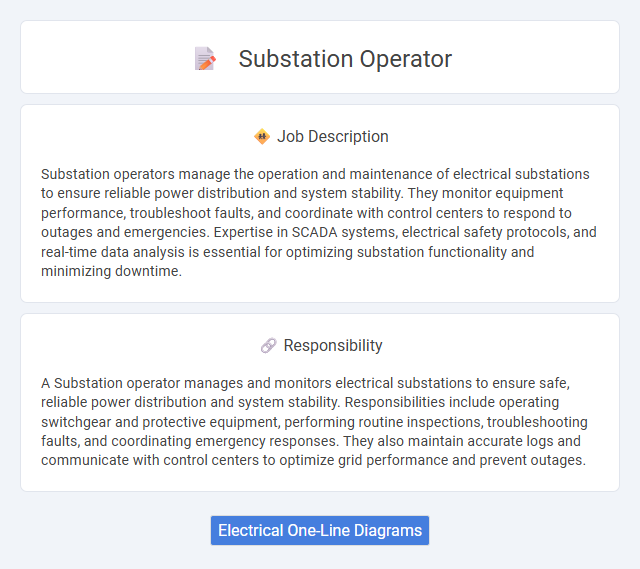
Substation operators manage the operation and maintenance of electrical substations to ensure reliable power distribution and system stability. They monitor equipment performance, troubleshoot faults, and coordinate with control centers to respond to outages and emergencies. Expertise in SCADA systems, electrical safety protocols, and real-time data analysis is essential for optimizing substation functionality and minimizing downtime.
Individuals with strong problem-solving skills and the ability to remain calm under pressure are likely suitable for substation operator roles. Candidates who demonstrate keen attention to detail and good physical health may have a higher probability of performing well in this job. Those who struggle with stressful environments or lack technical aptitude might find this occupation less compatible with their abilities.
Qualification
A Substation Operator requires a strong background in electrical engineering or a related technical field, typically holding a diploma or degree along with relevant certifications such as OSHA or NERC compliance training. Proficiency in operating and maintaining high-voltage equipment, understanding protection relays, and performing routine inspections is crucial. Experience with SCADA systems and knowledge of safety protocols and emergency procedures ensures effective management of electrical substations.
Responsibility
A Substation operator manages and monitors electrical substations to ensure safe, reliable power distribution and system stability. Responsibilities include operating switchgear and protective equipment, performing routine inspections, troubleshooting faults, and coordinating emergency responses. They also maintain accurate logs and communicate with control centers to optimize grid performance and prevent outages.
Benefit
A Substation operator job likely offers competitive salaries and comprehensive benefits, including health insurance and retirement plans. The role may provide opportunities for career advancement and specialized technical training. Employees might also benefit from a stable work schedule and a strong sense of job security in the energy sector.
Challenge
Substation operator roles likely present significant challenges in managing complex electrical equipment and ensuring continuous power distribution without interruptions. The job probably requires acute attention to detail and swift problem-solving abilities to address unexpected faults or system malfunctions. Handling high-pressure situations while maintaining safety protocols is expected to be a common difficulty in this position.
Career Advancement
Substation operators control and monitor electrical equipment in power substations, ensuring safe and efficient electricity distribution. Career advancement opportunities include progressing to senior operator roles, supervisory positions, or transitioning into electrical engineering and asset management within utility companies. Gaining certifications such as NERC System Operator or specializing in automation and SCADA systems significantly enhances promotion prospects.
Key Terms
Electrical One-Line Diagrams
Substation operators rely heavily on Electrical One-Line Diagrams to monitor and control high-voltage equipment within electrical substations, ensuring safe and efficient power distribution. These diagrams provide a simplified representation of complex electrical circuits, enabling operators to quickly identify equipment status, fault locations, and system configurations. Proficiency in interpreting and utilizing one-line diagrams is critical for effective substation management, fault troubleshooting, and coordinating maintenance activities.
 kuljobs.com
kuljobs.com